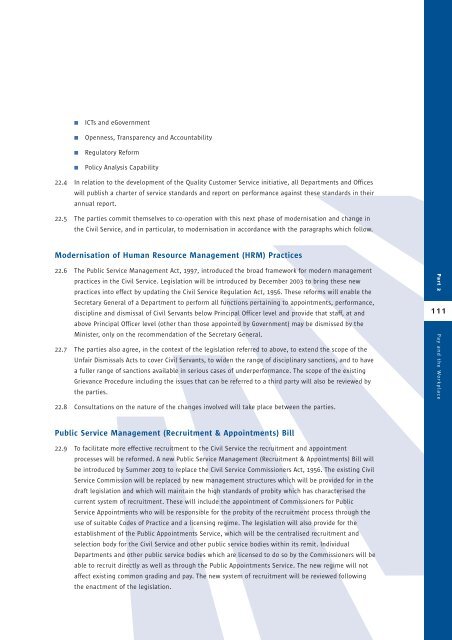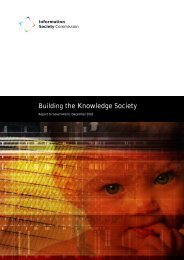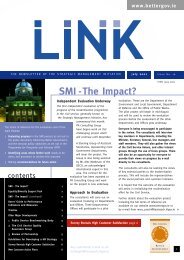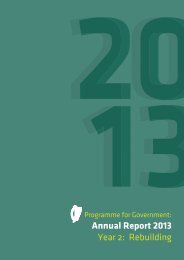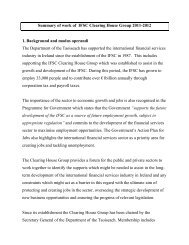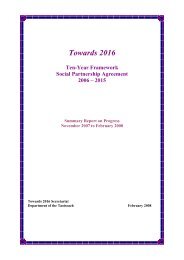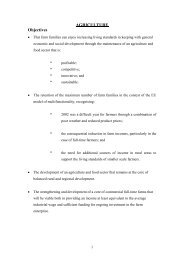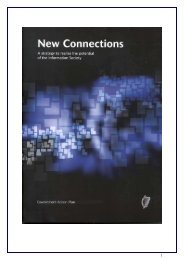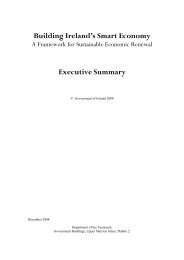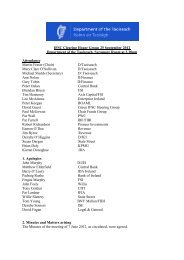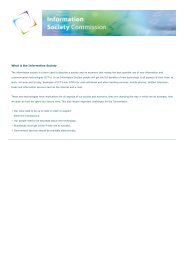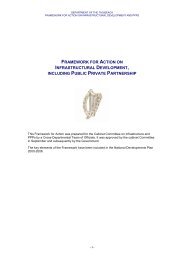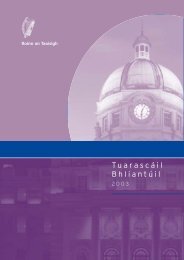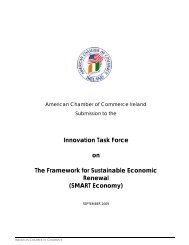Sustaining Progress - Department of Taoiseach
Sustaining Progress - Department of Taoiseach
Sustaining Progress - Department of Taoiseach
You also want an ePaper? Increase the reach of your titles
YUMPU automatically turns print PDFs into web optimized ePapers that Google loves.
■ ICTs and eGovernment<br />
■ Openness, Transparency and Accountability<br />
■ Regulatory Reform<br />
■ Policy Analysis Capability<br />
22.4 In relation to the development <strong>of</strong> the Quality Customer Service initiative, all <strong>Department</strong>s and Offices<br />
will publish a charter <strong>of</strong> service standards and report on performance against these standards in their<br />
annual report.<br />
22.5 The parties commit themselves to co-operation with this next phase <strong>of</strong> modernisation and change in<br />
the Civil Service, and in particular, to modernisation in accordance with the paragraphs which follow.<br />
Modernisation <strong>of</strong> Human Resource Management (HRM) Practices<br />
22.6 The Public Service Management Act, 1997, introduced the broad framework for modern management<br />
practices in the Civil Service. Legislation will be introduced by December 2003 to bring these new<br />
practices into effect by updating the Civil Service Regulation Act, 1956. These reforms will enable the<br />
Secretary General <strong>of</strong> a <strong>Department</strong> to perform all functions pertaining to appointments, performance,<br />
discipline and dismissal <strong>of</strong> Civil Servants below Principal Officer level and provide that staff, at and<br />
above Principal Officer level (other than those appointed by Government) may be dismissed by the<br />
Minister, only on the recommendation <strong>of</strong> the Secretary General.<br />
22.7 The parties also agree, in the context <strong>of</strong> the legislation referred to above, to extend the scope <strong>of</strong> the<br />
Unfair Dismissals Acts to cover Civil Servants, to widen the range <strong>of</strong> disciplinary sanctions, and to have<br />
a fuller range <strong>of</strong> sanctions available in serious cases <strong>of</strong> underperformance. The scope <strong>of</strong> the existing<br />
Grievance Procedure including the issues that can be referred to a third party will also be reviewed by<br />
the parties.<br />
22.8 Consultations on the nature <strong>of</strong> the changes involved will take place between the parties.<br />
Public Service Management (Recruitment & Appointments) Bill<br />
22.9 To facilitate more effective recruitment to the Civil Service the recruitment and appointment<br />
processes will be reformed. A new Public Service Management (Recruitment & Appointments) Bill will<br />
be introduced by Summer 2003 to replace the Civil Service Commissioners Act, 1956. The existing Civil<br />
Service Commission will be replaced by new management structures which will be provided for in the<br />
draft legislation and which will maintain the high standards <strong>of</strong> probity which has characterised the<br />
current system <strong>of</strong> recruitment. These will include the appointment <strong>of</strong> Commissioners for Public<br />
Service Appointments who will be responsible for the probity <strong>of</strong> the recruitment process through the<br />
use <strong>of</strong> suitable Codes <strong>of</strong> Practice and a licensing regime. The legislation will also provide for the<br />
establishment <strong>of</strong> the Public Appointments Service, which will be the centralised recruitment and<br />
selection body for the Civil Service and other public service bodies within its remit. Individual<br />
<strong>Department</strong>s and other public service bodies which are licensed to do so by the Commissioners will be<br />
able to recruit directly as well as through the Public Appointments Service. The new regime will not<br />
affect existing common grading and pay. The new system <strong>of</strong> recruitment will be reviewed following<br />
the enactment <strong>of</strong> the legislation.<br />
Part 2 Pay and the Workplace<br />
111


